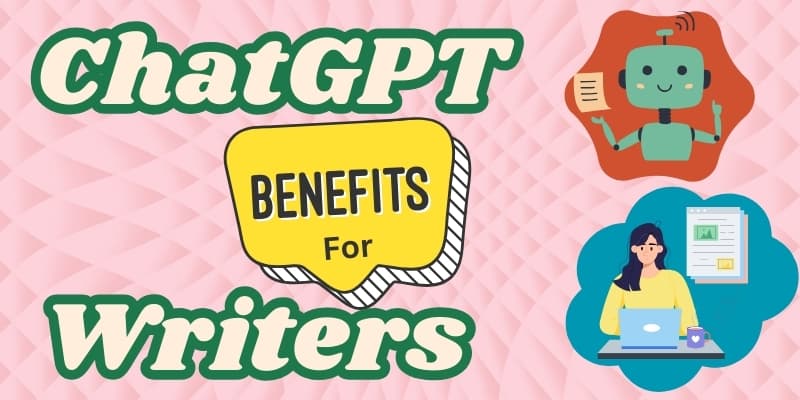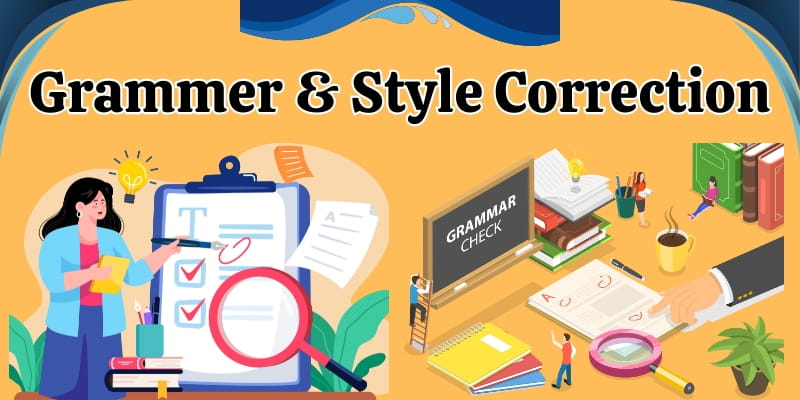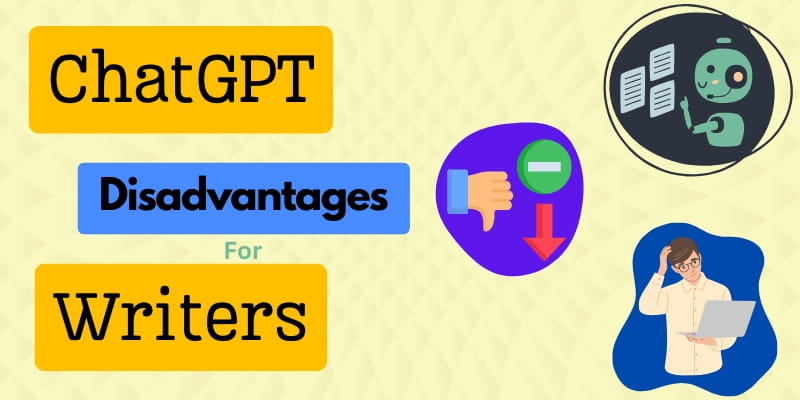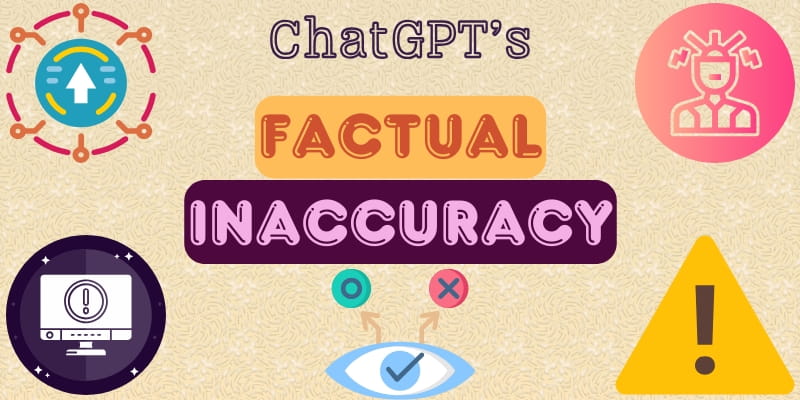What are the Advantages and Disadvantages of ChatGPT for Writers
ChatGPT is a tool that many writers are turning to for help with their writing. It can assist with generating content, checking grammar, and improving creativity.
But like any tool, it has pros and cons. So, guys, let's examine the advantages and disadvantages of using ChatGPT for writers to help you understand its true value.
Advantages of ChatGPT for Writers
Writing with ChatGPT allows me to be more creative, efficient, and professional in my work. It's like having a virtual assistant that can help with everything from ideation to grammar edits.

Here is the list of all the pros of chatgpt for writers:
- Rapid Content Generation
- Idea Generation and Brainstorming
- Overcoming Writer's Block
- Research Assistance
- Language Translation
- Grammar and Style Correction
- Enhanced Clarity and Coherence
- Vocabulary Expansion
- Tone and Style Adjustment
- Consistent Writing Pace
- SEO-Optimized Content
- Customized Feedback and Editing
Let’s learn how it makes writing more manageable for us.
1. Rapid Content Generation
ChatGPT has made content creation much easier for me. Tasks that used to take hours can now be completed in minutes. It has truly proven to be a game-changer for speeding up my writing process.
- Makes drafts in just a few minutes
- Saves time for editing and improvements
- Works well under tight deadlines
- Helps manage heavy workloads
- Provides a good starting point for writing
2. Idea Generation and Brainstorming
Think about it—how far can the human mind really think? Even though we can think a lot, we sometimes get stuck.
For thinking outside the box, we need new ideas, and ChatGPT makes this process so simple. Just give it some prompts and enjoy the ideas it generates for you.
- Suggests creative topics for blogs and projects
- Offers fresh angles to explore
- Helps overcome idea block quickly
- Works like a non-stop brainstorming partner
- Makes starting a project much easier
3. Overcoming Writer’s Block
Writer's block is a real pain, but ChatGPT can help by giving you prompts and new angles to think about. This way, you can overcome the block and keep writing without interruptions.
- Suggests new sentences and paragraphs
- Offers ideas to keep your writing flowing
- Stops frustration and saves time
- Keeps productivity high during tough moments
- Inspires you when feeling out of ideas
4. Research Assistance
Research takes up a lot of time, but ChatGPT can quickly summarize information, saving hours of work. It makes the research process fast and efficient, so I can spend more time writing.
- Summarizes facts in simple terms
- Explain concepts you don’t understand
- Gives a good base for deeper research
- Saves time on basic topic searches
- Encourages you to double-check important details
5. Language Translation
If you need to write in another language, ChatGPT can translate your text with accuracy. This feature has helped me many times, especially when I needed content in different languages and contexts.
- Translates phrases into different languages
- Makes communication clearer across languages
- Useful for writing in multiple languages
- Supports multilingual content creation
- Works well for simple translations but may need a review
6. Grammar and Style Correction
Good content always needs proper grammar and style. This is what defines a great writer.

Thanks to ChatGPT, it can check grammar and improve the style in just one click.
- Spots and corrects grammar and punctuation errors
- Improves sentence structure for clarity
- Suggests better words to use
- Makes writing professional and polished
- Enhances readability with simple fixes
7. Enhanced Clarity and Coherence
As an expert proofreader, I’ve seen many writers struggle with clarity and coherence in their content. If you're not familiar with the "five C’s of writing," don’t worry—ChatGPT can fix your content and make it coherent in no time.
- Connects sentences smoothly
- Organizes ideas into a logical flow
- Explains complex topics in simple ways
- Helps create clear and easy-to-read content
- Makes content more engaging for readers
8. Vocabulary Expansion
A writer needs a strong vocabulary bank, but even then, our memory sometimes gets stuck. While we can use synonyms once or twice, we struggle by the third time. ChatGPT can give your content a fresh style with different vocabulary whenever you need it.
- Suggest new words for variety
- Avoids using the same words repeatedly
- Introduces creative ways to express ideas
- Adds more interest to your writing
- Teaches new words while you write
9. Tone and Style Adjustment
You can adjust the tone and style of your content through ChatGPT. Whether you provide existing content or generate new content, you can shape it to suit your preferences.
- Adapts tone for formal, casual, or technical writing
- Fits the style of emails, blogs, or reports
- Keeps tone consistent throughout the content
- Helps target the right audience easily
- Useful for writing in different formats
10. Consistent Writing Pace
For writers, maintaining a steady writing pace is tough, but ChatGPT provides continuous prompts, helping you stay consistent and productive.
- Provides ideas to maintain momentum
- Helps you stay focused on tasks
- Saves time by avoiding interruptions
- Supports long or challenging projects
- Keeps your work flowing smoothly
11. SEO-Optimized Content
If you want to rank your content on Google, it must be SEO-optimized. ChatGPT makes this easy by helping with keyword placement and SEO factors. Just provide the guidelines, and it will deliver SEO-friendly content.
- Suggests useful keywords to include
- Writes clear titles and descriptions
- Ensures content is easy to read and optimized
- Improves chances of better search rankings
- Attracts more readers with SEO-friendly content
12. Customized Feedback and Editing
Having another set of eyes is always helpful. ChatGPT can give personalized feedback and edit your writing to make it even better. Simply share your content and see the results.
- Allows you to review and tweak the content
- Finds and corrects mistakes in seconds
- Adjusts tone and style as per your preferences
- Suggests simpler or more effective sentences
- Helps turn drafts into polished, professional writing
Disadvantages of ChatGPT for Writers
While ChatGPT helps me in many ways, it also has some limitations. These issues can affect the quality, originality, and accuracy of my work. Knowing these drawbacks helps me use ChatGPT carefully and avoid relying on it too much.

Here are some of the challenges I face when using it:
- Lack of Original Thought
- Limited Creative Flair
- Dependence on Prompts
- Factual Inaccuracy
- Bias in Training Data
- Misinterpretation of Context
- Plagiarism Concerns
- Authorship and Originality
- Ethical Implications
- Word Limit Restrictions
- Difficulty with Complex Topics
- Reliance on Internet Connection
Let us know in detail about these cons of chatgpt for writers.
1. Lack of Original Thought
Always remember that AI cannot replace human creativity. Even though ChatGPT can generate content for you, it often lacks originality and personal touch unless you edit it yourself.
- It creates content based on learned patterns
- Suggestions can feel generic and repetitive
- Doesn’t replace human insights or originality
- Needs your touch to add personal creativity
- Works best for structured, not personal content
2. Limited Creative Flair
ChatGPT can give you structured content, but creativity is something it cannot provide. To add that creative touch, you will still need to edit manually.
- Generates structured but less imaginative content
- Lacks depth or twists in storytelling
- Needs added creativity for unique projects
- Works better for informative tasks than artistic ones
- Leaves creative writing to human expertise
3. Dependence on Prompts
ChatGPT is heavily dependent on the prompts you give. It will only do what you ask, and sometimes it can even miss your instructions.
- Unclear prompts lead to off-topic results
- Needs detailed guidance for complex tasks
- Cannot handle unclear or open-ended queries well
- Requires extra effort to refine prompts
- Best suited for straightforward instructions
4. Factual Inaccuracy
The ChatGPT database isn’t updated in real time, which means it might not provide the latest facts or figures.

If you’re doing research or need accurate stats, it’s important to verify them manually through Google.
- Needs fact-checking to ensure accuracy
- This can lead to mistakes in research-based tasks
- Avoid relying on it for critical details
- Always verify its output with reliable sources
- Double-check facts before using them in the final content
5. Bias in Training Data
A wide range of texts from different sources make up the training data for ChatGPT, and these texts may have flaws. Because of this, some of my outputs may unintentionally reflect such opinions, which could result in biased or disorganized content.
- Its output may accidentally include stereotypes
- Requires caution when used for sensitive topics
- Not entirely free from societal or cultural biases
- Human review is needed to ensure fair content
- Be careful of any unintended bias in the output
6. Misinterpretation of Context
Sometimes, ChatGPT might not fully understand the context of your request, especially if it’s complex. This can lead to off-target responses that don’t align with your needs.
- May take prompts too literally
- Can provide irrelevant or incorrect responses
- Requires extra effort to clarify your requests
- Struggles with abstract or detailed topics
- Works better with simple, direct instructions
7. Plagiarism Concerns
Since ChatGPT generates content based on existing information, there’s always a risk of unintentional plagiarism. It’s important to review and edit the output to ensure originality.
- Raises issues of originality in writing
- Requires editing to ensure unique work
- Avoid directly copying its responses
- Always rewrite in your own words for safety
- Helps generate ideas but needs a personal touch
8. Authorship and Originality
Using ChatGPT raises questions about the originality of your work. While it’s helpful, you need to add your personal contributions to make it truly your own.
- Contributions might feel less authentic
- Reduces the human voice in creative projects
- Works better for support than full authorship
- Needs your style to create truly personal content
- Balances AI assistance with your input
9. Ethical Implications
Writers need to be mindful of ethical concerns when using AI. While ChatGPT can assist with writing, its involvement should be transparent to avoid any ethical issues.
- Some believe using AI for writing is unfair
- It's important to mention when AI is used in work
- AI-created content might lack clarity
- It brings up questions about professional honesty
- It should be used carefully to follow ethical rules
10. Word Limit Restrictions
ChatGPT can only generate up to 3,000 words per response.

If you need more content, you’ll have to divide your text into multiple parts, which can be inconvenient.
- Large projects need to be divided into smaller parts
- Combining pieces later can be difficult
- Can interrupt workflow for long writing tasks
- Requires adjustments for extensive content
- Works best for shorter writing pieces
11. Difficulty with Complex Topics
ChatGPT struggles with very specialized or complex topics. Its training is limited, so it might not cover every niche subject thoroughly.
- Provides unclear or incomplete explanations
- Lacks in-depth analysis for advanced topics
- Needs extra research for accurate content
- Cannot replace expert knowledge in niche areas
- Works best for general or simple topics
12. Reliance on Internet Connection
The final disadvantage that can stop our online work is the internet connection. So yes, this is also a major flaw of ChatGPT. If your internet is down, ChatGPT's functionality stops, too.
- Becomes inaccessible during connection issues
- Inconvenient for urgent tasks without internet
- Requires a stable connection for smooth usage
- Plan backups for offline writing when needed
- May cause delays during network disruptions
Points to Be Noted
Here are some key points you need to remember always as a writer:
- Know the basics of content writing: You can give as many humanizing commands to ChatGPT as you like, but manual adjustments are always needed for high-quality content. Things need to be set accordingly.
- Don’t generate all content at once: Never try to generate all the content in one go.
- Prepare ChatGPT first: Before giving any prompt, you need to prepare ChatGPT for the type of task at hand so it can act accordingly.
- Generate in different variants: Always generate content in different variants. This way, you learn how to present one idea in different ways, and it’s also the best method to get content from ChatGPT.
- Modify when confused: If you don’t understand something, ask ChatGPT to modify that part.
- Competitor analysis is a must: Always analyze competitors’ content before using anything from ChatGPT. Also, after generating content, always read it carefully, as sometimes ChatGPT can provide incorrect data.
- Repetition issue: ChatGPT has a bad habit of repeating things too much. You need to manually reduce these repetitions.
- Avoid relying blindly on If your content includes things that need regular updates, such as review articles or time-sensitive content, do not just pick it up blindly from ChatGPT. It’s important to verify it through Google for accuracy manually.
Fun Facts about ChatGPT for Writers
Here are some interesting facts about ChatGPT, according to Meetanshi's blog.
- OpenAI launched ChatGPT on November 30, 2022, as a research preview. It gained 1 million users within 5 days.
- According to a survey conducted in January 2024, it now has 1.8 billion users.
- Readers believe 46.9% of the content is AI-written, 36.3% AI-written but edited, and 16.7% written by humans.
- 54.65% of users are male, and 45.35% are female.
- The U.S. accounts for 13.79% of users, and India contributes 6.74%.
- ChatGPT has over 100 million weekly active users and 16 billion all-time views.
- On May 23, 2023, ChatGPT launched plugins.
- Microsoft-funded OpenAI is forecasted to generate $200 million in 2023.
- The bounce rate is 38.51%, meaning many visitors leave after viewing just one page.
- Visitors spend an average of 56 seconds on the website.
- On average, users view 2.41 pages per visit.
- Most traffic (76.38%) comes from direct sources.
- ChatGPT is available in 161 countries but is banned in China, Russia, Ukraine, Belarus, Afghanistan, Iran, and Venezuela.
Conclusion
In this article, we’ve covered ChatGPT for writers in detail.
If you're new to the writing world, my advice is first to learn the basics of content writing or take a writing course to build a strong foundation. This will allow you to use tools like ChatGPT as best as possible.
We also offer a content writing course that can guide you through this! Once you're comfortable with the basics, AI tools will help elevate your writing.
Common Questions
Here are some of the most frequently asked questions related to the pros and cons of ChatGPT for writers:
Yes, ChatGPT can help you draft entire articles. However, the quality depends on how well you structure your prompts. It’s always a good idea to review and edit the content to make sure it matches your style and message.
Absolutely! For new writers, ChatGPT can be a great tool for learning the basics. It helps by suggesting structure, generating ideas, and correcting grammar, making it easier for beginners to get started.
Yes, ChatGPT can offer fresh ideas or even write the next section of your work. By simply describing your topic or asking for suggestions, you can break through writer's block and get back to writing.
There is a small risk, as ChatGPT generates content based on patterns in its data. It's important to double-check your work to ensure it's original and properly cited. Always review the content to avoid unintentional copying.
ChatGPT does its best to understand context, but sometimes, it may miss subtle details. Provide clear and specific instructions so it can offer the most relevant suggestions. Be sure to review the content to ensure it fits your needs.
Yes, ChatGPT can help by spotting grammar errors, suggesting better word choices, and improving the overall clarity of your writing. It’s a helpful tool for editing drafts and refining your final piece.
While ChatGPT is a great tool for many tasks, it’s important not to rely on it too much. Use it for brainstorming, drafting, or improving grammar, but ensure you still put your creativity and effort into your writing. It’s best as a supplement, not a replacement.
- ✔ Be Respectful
- ✔ Stay Relevant
- ✔ Stay Positive
- ✔ True Feedback
- ✔ Encourage Discussion
- ❌ Avoid Spamming
- ❌ No Fake News
- ❌ Don't Copy-Paste
- ❌ No Personal Attacks


